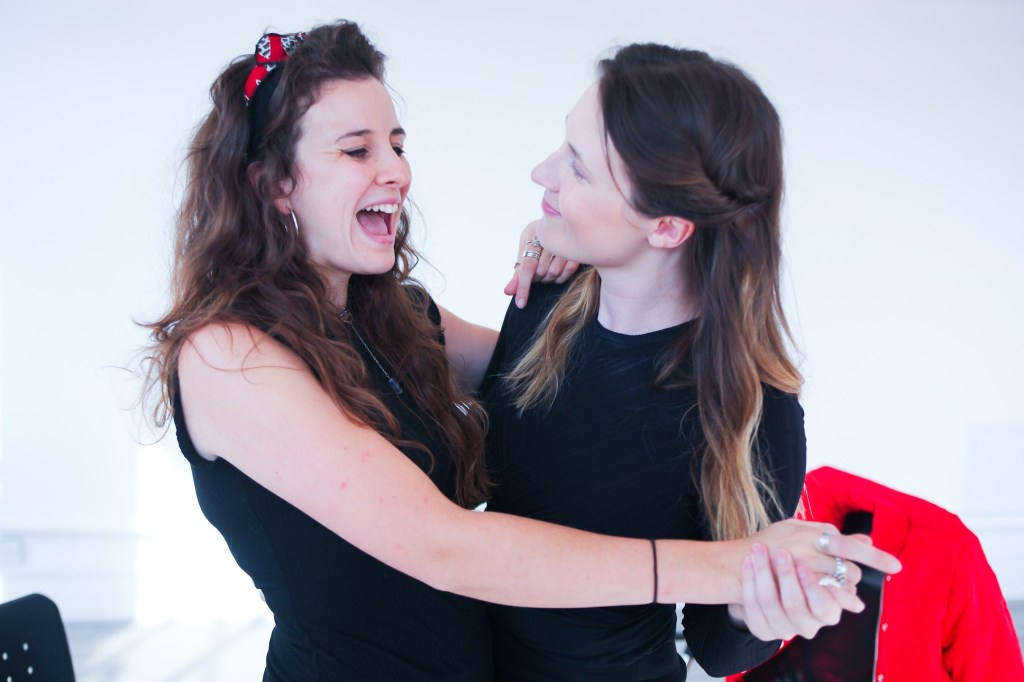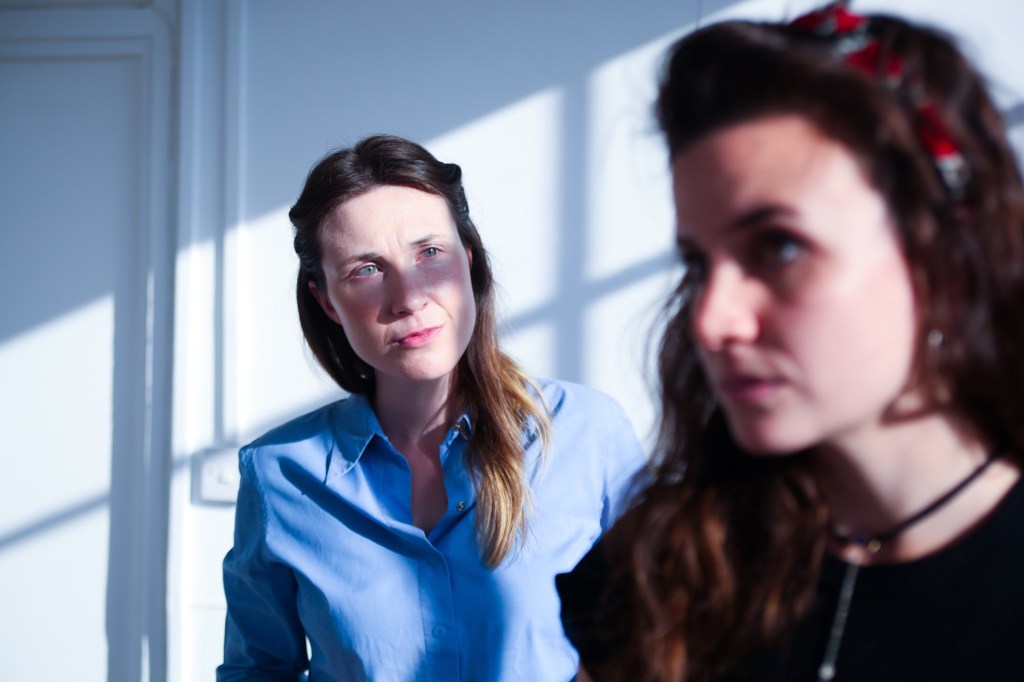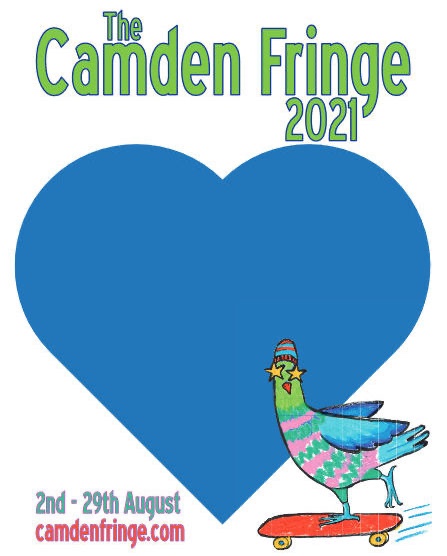“Lovesick”, an intriguing new play about a transplant patient and her surgeon, is set to play the Hen & Chickens Theatre on the 17th and 18th August as part of the Camden Fringe. Here, writer Georgina Barley (who also performs in the play) and Director and Dramaturg Marlie Haco chat about influences, the creative journey and championing women’s work in the industry…

First of all, how are things going in the run up to your run at the Camden Fringe?
MH: They’re going well I think! We’ve now had a chance to do a few full runs of the play and it’s just been so exciting to see it all come together. With only a few days before opening night, we’re still discovering new things about the characters and their stories, which just reflects the strength of the writing as well as the ability of the cast to keep playing and experimenting with the material. Now, I just can’t wait to get into the theatre and let all the other production elements work their magic on the show too.
There’s quite an intriguing dynamic at the heart of this play, following a heart-transplant patient and her surgeon to look at‘the extent to which organs hold memory’ – can you tell me alittle about what inspired ‘Lovesick’ and how it came to be?
GB: I’ve always had an interest in the history of science and medicine, and enjoy stories that use a scientific stimulus to explore alternative realities and complex relationships (science fiction, I suppose!) I happened to be listening to Bob Dylan’s song ‘Lovesick’ one day, and was inspired to create a play based on the premise of love as a medical complication or side effect.
The idea of organs holding an emotional memory can apply to the notion that certain emotions sit or originate in different parts of the body (love and the heart being an obvious association), as well as the theory that transplanted organs can transfer something more than just tissue from the donor to the recipient – I am intrigued by the idea that a recovering transplant patients could discover foreign memories and sensations, or new skills and inclinations. Love in itself is such a complex emotion, and sometimes it is near impossible to locate where the feeling comes from. I wanted to use the heart transplant procedure as the catalyst to tease out this idea, and explore the complex dynamic between the two central characters of the play – their fears and desires, what motivates or inhibits them – to test the nature of their strong connection.

This piece did have a ‘Covid edit’ version in that it ran for alimited audience at the White Bear between lockdowns in 2020. How much has changed between then and now in this ‘new version’?
GB: Since I began writing this play in 2018 it has been under constant refinement! Before the ‘covid edit’ it was a completely different version with five characters. For the run last year I cut it down to just the two central characters, Maggie and Sarah, and placed them in a closed location and time. This process of re-drafting allowed me to distil the story down to its main essence and really focus on this one relationship. When I sent this version to Marlie, she offered valuable feedback that helped me to dig deeper into the themes and expand the story again, gradually drawing in more detail from the wider world of the play but keeping Maggie and Sarah’s relationship at the centre. It is, I believe, the most nuanced version of the play I’ve produced so far and I am very grateful for Marlie’s guidance.
What would you say have been the highlights of the creative process so far?
GB: I have thoroughly enjoyed the collaborative and detailed nature of our work in the rehearsal room, led by Marlie. So much of creating this play has been a solitary experience, and it does sometimes feel like just throwing words at a page and hoping they stick! But then being in the rehearsal room, carefully unpicking the strands of the story, weaving together these characters’ histories and lifting the words from the page into a living and breathing theatrical event – it’s been an incredible experience. It feels like we’ve created a real world.
MH: It’s hard to pick out highlights as it’s all been such a joy. Developing the play with Georgina in the few months before we started rehearsals, afforded me the wonderful opportunity to be a part of the play’s evolution. I’ve loved exploring the push and pull of the connection between Maggie and Sarah, both on the page and then with the cast in the rehearsal room. It has been incredibly rewarding to work with both Georgina (Sarah) and Avena (Maggie) – I’ve been so impressed with how they’ve really run with everything I’ve thrown at them, from detailed text-work to more abstract movement exploration. Having known each other for all of 5 weeks, Georgina and Avena have had no trouble capturing the complexity of this relationship, one that is as thrilling as it is painful for both characters.
If I really had to pick out a highlight from the process, it would probably be our time spent doing improvisations. Although I believe the text is the most important collaborator in the room, it has been so enjoyable to see these particular actors improvise around the scaffolding of a scene that we’d built together. Their ability to bring rigour, humour and lightness to every rehearsal has made working on a play that explores grief, loss and loneliness an utter pleasure and an experience I’m not likely to forget.

So this is billed as a drama which merges naturalistic dialogue,verse and movement to tell a story about grief, love and loneliness. For you, what does the inclusion of verse and movement bring to the telling of this story?
GB: Sometimes things are just really hard to express – the verse and the movement helps! It’s a very visceral story, very focused on sensations of the body, why we feel certain ways, what compels us to do certain things – sometimes it feels like a lot of the action of the play is actually driven by the unconscious impulses of the body, and the tension this creates with the characters’ rational intellect. I believe the combination of movement and verse reflects this.
MH: Building on what Georgina has already said, I feel that the verse and movement offer us another useful avenue through which to explore the fundamental questions at the heart of the play. Georgina and I discussed how the poetry acts as a lens onto the characters’ subconscious or conscience, aspects of human experience that exist on the edges of verbal expression. Furthermore, as a play about the body – the secrets and the truths the body holds – it felt only natural to make the body central to the storytelling. The movement that ties the scenes together allows us to witness the characters in more private moments as they attempt to process the powerful and confusing emotions this relationship stirs. Our fantastic composer James Hogan has also provided us with an evocative score that further hints at what the characters fail to communicate through spoken language.
With those themes at the heart of this story, is there a balance of light and dark at all here?
MH: There certainly is. Although Lovesick deals with weighty themes, it actually focuses, for the most part, on the magnetic pull of this relationship. In rehearsal, we’ve explored how exciting it is for each character to be in the presence of the other, and indeed, how the play turns on the fact that without investing in this intoxicating connection, we wouldn’t feel the sense of loss or grief either.

What/ who would you say your own theatrical influences are?
MH: I am probably most inspired by the theatrical processes of Katie Mitchell and I return to her book often, but Lyndsey Turner and Sacha Wares have also influenced my approach to developing and directing new writing. And then for the movement of this play specifically, I drew on the work of choreographers like Pina Bausch, Crystal Pite and Anne Teresa De Keersmaeker. I love the precision and detail of their approach to painting with bodies in space.
This is an almost all-female creative team, is this something you would like to continue to aim for going forward?
MH: Definitely! I have a particular interest in female-led stories so I think bringing them to life alongside other women will always feel like a gift. What’s more, it’s great to have the opportunity to redress the gender balance by offering roles towomen where they have historically been under-represented. Having said that, one of our most indispensable members ofthe Lovesick team has been our composer, James, despite the fact that I’ve never actually met him in person as he’s based in Australia!
And finally, in just one sentence, why should audiences see‘Lovesick’?
MH: Because it’s a wonderful piece of new writing, beautifully acted, and hopefully, an exciting theatrical experience.
GB: We’ve been very careful not to give too much of the plot away – so you’ll just have to watch it to find out what happens!
So there you have it! Remember: “Lovesick” plays the Hen & Chickens Theatre on the 17th and 18th August as part of the Camden Fringe and you can find your tickets here.

Leave a comment